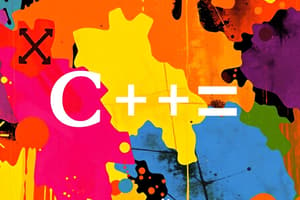Podcast
Questions and Answers
What does Object Oriented Programming (OOP) emphasize?
What does Object Oriented Programming (OOP) emphasize?
- Procedures
- Data (correct)
- Functions
- Global Data
In Procedural Oriented Programming (POP), data is structured together with functions.
In Procedural Oriented Programming (POP), data is structured together with functions.
False (B)
C++ is considered an incremental version of the ______ language.
C++ is considered an incremental version of the ______ language.
C
What is the file extension of a C++ program?
What is the file extension of a C++ program?
Which of the following concepts is NOT available in Procedural Oriented Programming?
Which of the following concepts is NOT available in Procedural Oriented Programming?
What is a class in C++?
What is a class in C++?
Which of the following features are supported by C++?
Which of the following features are supported by C++?
What is the purpose of the dot syntax in C++?
What is the purpose of the dot syntax in C++?
Study Notes
Procedural vs. Object-Oriented Programming
- Procedural Programming emphasizes actions and functions, operating on data. Focuses on what needs to be done.
- Object-Oriented Programming focuses on data and objects. It aims to represent real-world concepts as objects with attributes and methods. Focuses on how things are structured.
Introduction to Object-Oriented Programming
- C++ is an incremental version of C, including all its features with added Object-Oriented capabilities.
- C++ supports both procedural and object-oriented programming.
- C++ programs have a .cpp file extension.
- C++ prioritizes data over procedures.
- C++ offers features like polymorphism, encapsulation, and inheritance.
- C++ supports limited data access through visibility modes and promotes data security via data hiding.
- C++ supports dynamic binding, allowing for flexible interactions between objects.
Concepts of OOP in C++
- Classes and Objects: Fundamental concepts of OOP. Classes act as blueprints for creating objects.
- Example of Class:
class MyClass { // Class declaration public: // Access specifier int myNum; // Attribute (int variable) string myString; // Attribute (string variable) }; - Creating Objects: Objects are instances of classes.
MyClass myObj; // Creating an object 'myObj' of class 'MyClass' - Accessing Attributes: Use dot syntax (.) to access attributes of an object.
myObj.myNum = 15; myObj.myString = "Some text";
Data Types in C++
- Fundamental Data Types:
- char
- short int
- int
- unsigned int
- long
- unsigned long
- float
- double
- long double
- bool
- void
- Data Type Hierarchy:
char -> short int -> int -> unsigned int -> long -> unsigned long -> float -> double -> long double
- Data Type Hierarchy:
- Character (char): Single character
- Integer (int): Whole numbers
- Float (float): Decimal numbers with lower precision
- Double (double): Decimal numbers with higher precision
- Boolean (bool): Represents logical values (true, false)
- Void (void): Represents the absence of a type, used in functions that don't return anything or take any arguments.
Studying That Suits You
Use AI to generate personalized quizzes and flashcards to suit your learning preferences.
Related Documents
Description
This quiz delves into the fundamental concepts of Object-Oriented Programming (OOP) using C++. It covers the differences between procedural and object-oriented paradigms, focusing on key features of C++ such as classes, objects, inheritance, and polymorphism. Test your understanding of how these concepts are applied in real-world programming scenarios.




